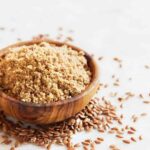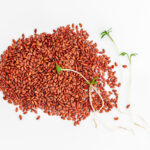WHAT DOES GSG THINK ABOUT THE PALEO DIET? part 2 of 2
The GreenSmoothieGirl View
I do agree with Paleo theory that hybridized grains are a bad idea. Ditto processed foods. Any diet that gets us OFF PROCESSED FOODS will make you feel better. People get very emotional defending Eat Right for Your Blood Type–because people who followed it felt better. Sure they did! Every single one of the blood types are told to not eat refined flour or sugar!
Again, correlation does not prove causation. Just because you feel better not eating junk food doesn’t mean there’s any validity to being pigeonholed by your blood type. After all, ALL cultures of the world have ALL the blood types represented! So how much sense does it make to tell A-positive folks that their blood type means they came from Europe and therefore they must eat grain and no meat like their ancestors did, who were all A blood type? Whereas Type O folks need to eat a lot of meat and do a lot of yoga rather than cardio. Or whatever it is. I read it once. I studied its scientific assumptions, which are head-scratchers, and moved on.)
But not all grains are bad. Fruit is good food. Many vibrantly healthy people don’t eat cooked animal flesh, which has very low energy, which you can measure. A leafy green has 30 times the megahertz of energy that a chicken breast does.
Meat Concerns
Humans have a GI tract that is 35 feet long, unlike carnivores that have short digestive tracts. This means that animal flesh putrefies before it leaves the body. Meat ages us quickly. If you don’t believe me, take a look at the faces of long-time bodybuilders and fitness competitors. Eating so much protein draws heavily on our limited digestive enzyme stores. The China Study is the biggest piece of nutrition research in history, and its clear conclusion is that a 20%+ animal protein diet puts us at high risk for all degenerative disease, especially cancer.
If we do eat animal protein, it should be clean, and it must be a minor part of a meal that is mostly high-fiber, raw plant food. Like a small portion of fish or poultry with a huge salad or big green smoothie.
Dangerous Diet
Atkins went away when so many people got sick from it, and the data about this began to be well-known. Atkins followers had bad breath, constipation, and plenty of heart disease and cancer. Its overweight founder died of heart disease.
I hope Paleo dies soon, too. I agree with Paleo followers about eating whole foods. They make no distinction between cooked and raw vegetables, and that’s a critically important difference, since raw foods require far fewer resources for the body to digest, leaving more energy for higher brain function, creativity, athletics, and just generally doing great things.
The Golden Nugget
My agreement with Paleo principles ends with eliminating refined foods and advocating for whole ones. I am sure I will get some backlash from Paleo followers. That makes sense, because they’re spending a lot of time and dough following that “diet.” Sometimes we over-commit to things we’ve spent a lot of time and energy and money on. Plus, as you mentioned, Marianne, this diet is taught by Crossfit instructors.
The Truth Will Set You Free
But, I’m not going to endorse a fad just because it’s popular. I’m going to tell the truth as I see it. Feel free to reject it if you want. Just remember: you may feel better and be leaner on Paleo. But anyone will, who gets off refined carbs. There are better, easier ways to get ripped and get healthy, that don’t harm your health, break the bank, and bankrupt the environment.
Posted in: Whole Food













